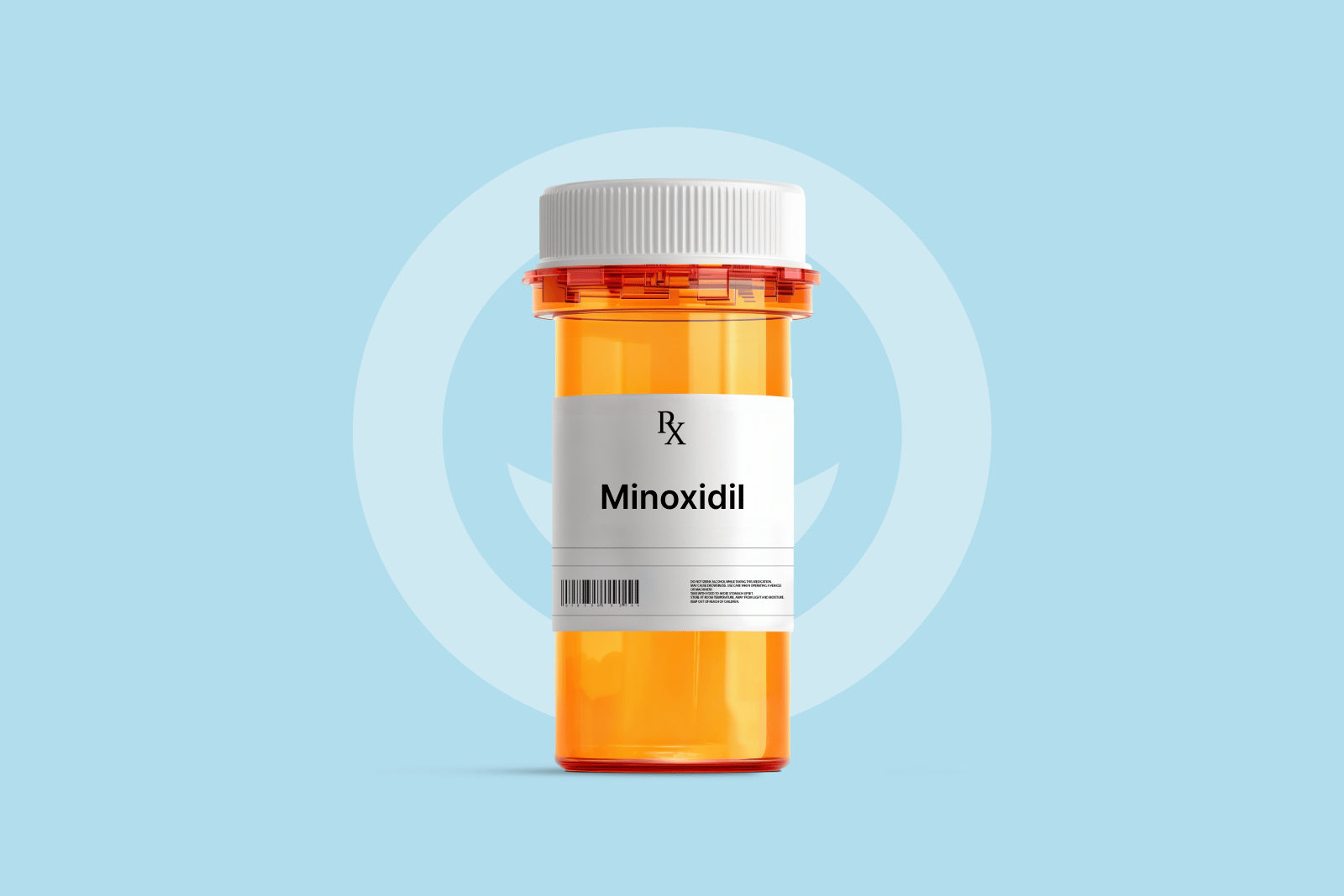
Oral and topical Minoxidil online prescriptions for hair loss
If you’re suffering from hair loss, minoxidil can help. Minoxidil slows hair loss and can even be successful in regrowing hair. In addition to topical minoxidil (Rogaine), oral minoxidil is available by prescription. Speak to a board-certified PlushCare primary care doctor today to discuss a prescription for oral minoxidil.*
About minoxidil
Oral minoxidil is mainly prescribed for male and female pattern hair loss. However, it can also help treat hair loss from other conditions, including alopecia areata and telogen effluvium. Topical minoxidil solution is the generic form of Rogaine and is available over the counter without a prescription.
It’s always important to follow the specific instructions when taking your prescription, as they can vary based on the formulation and dosage prescribed.
Minoxidil uses
The only FDA-approved use for minoxidil is hypertension. It is widely used off-label, and your PlushCare primary care doctor may prescribe minoxidil off-label to treat hair loss.
Hair loss
While oral minoxidil has not been FDA-approved for hair loss treatment, low-dose oral minoxidil is extremely effective in promoting hair growth. Low-dose oral minoxidil can help treat hair loss from several conditions, including androgenetic alopecia, alopecia areata, and traction alopecia.
Hypertension (high blood pressure)
As an antihypertensive drug, oral minoxidil works by relaxing blood vessels. Oral minoxidil enables blood to pass through blood vessels more easily, which helps lower blood pressure.
Minoxidil side effects
- Nausea and vomiting
- Changes in facial and body hair
- Unwanted hair growth
- Burning, stinging, or redness at the application site (when using topical minoxidil)
Other side effects, which are less common but might be more severe, could include:
- Increased heart rate
- Rapid, unexplained weight gain
- New or worsening arm, shoulder, or chest pain
You should call your doctor if you notice any of these side effects, or if you develop any other new or concerning symptoms. Tell your doctor if you're currently pregnant or breastfeeding, as minoxidil can have serious negative effects.
How to take minoxidil
After prescribing minoxidil, your online doctor will provide instructions for taking your pills. Be sure to read the prescription label and follow all instructions. Your care team can help answer any questions you may have about your prescription.
Oral minoxidil
Oral minoxidil is available in two different doses, so be sure to follow the specific instructions on your prescription. For adults, the typical starting dose of oral minoxidil for the treatment of hair loss is 1.25 mg for men or 0.25 mg for women, taken once per day.
Your doctor may increase your dose to 5 mg a day for men or 2.5 mg a day for women, taken once or twice per day, as needed.
Minoxidil topical solution (Rogaine)
Topical minoxidil is available as a liquid or foam solution and can be applied directly to the scalp. Topical minoxidil solution is designed for use twice a day. Your doctor may recommend applying minoxidil once in the morning and once in the evening, typically a few hours before bed.
Although topical minoxidil can reduce hair loss, it doesn't cure baldness. To maintain your new hair growth, it's important to continue using topical minoxidil as directed.
What to avoid while taking minoxidil
Minoxidil has a few drug interactions. They include drugs for high blood pressure and drugs that interact with alcohol. Don’t change what you're currently taking without checking with your doctor or pharmacist. That includes other medications or supplements, as well as over-the-counter drugs.
Talk to your doctor if you're taking any other medications to lower blood pressure, such as guanethidine. Minoxidil can cause very low blood pressure when taken with other hypertension drugs.
Ask your doctor or pharmacist if it's acceptable to consume alcohol while taking oral minoxidil. Combined with oral minoxidil, regular alcohol consumption may significantly decrease blood pressure, leading to adverse effects.
Alternative medications to minoxidil
If your healthcare professional prefers to put you on another treatment altogether, they may suggest another hair loss treatment or prescribe a different vasodilator. Here are some common doctor-recommended alternatives based on your health issue:
Oral minoxidil prescription FAQs
How much does oral minoxidil cost?
How can I refill my minoxidil prescription?
Who should not take minoxidil?
You should not take minoxidil if:
-
You're currently pregnant or breastfeeding
-
You're taking certain hypertension drugs
-
You have an adrenal medulla tumor (pheochromocytoma)
-
You've had an allergic reaction to minoxidil
What happens if I miss a dose of minoxidil?
What happens if I take too much minoxidil?
Can minoxidil regrow hair?
If you suffer from hair loss disorders such as androgenic alopecia, alopecia areata, or female/male pattern baldness, consider talking to your doctor about minoxidil.
What are the dangers of minoxidil?
Although minoxidil is safe and effective for most people, you may experience side effects. Common side effects of minoxidil include:
-
Nausea and vomiting
-
Changes in facial and body hair (i.e., thicker hair)
-
Unwanted hair growth
-
Skin rashes and scalp irritation around the application site (when using topical minoxidil)
How long does it take for minoxidil to grow hair?
Does minoxidil give permanent hair growth?
3 simple steps to get your oral or topical Minoxidil prescription online

Book an appointment with a board-certified PlushCare primary care doctor to discuss minoxidil.

Talk to your doctor regarding a minoxidil prescription.

If prescribed, pick up your minoxidil prescription.
How pricing works
To get a new or refill prescription for minoxidil, join our monthly membership and get discounted visits.
30 days of free membership
- Same-day appointments 7 days a week
- Unlimited messages with your Care Team
- Prescription discount card to save up to 80%
- Exclusive discounts on lab tests
- Free memberships for your family
- Cancel anytime
Paying with insurance
Membership
$19.99
First month free
Visits
Copay
Visit price with insurance
Often the same as an office visit. Most patients with in-network insurance pay $30 or less!
We accept these insurance plans and many more:



Paying without insurance
Membership
$19.99
First month free
Visits
$129
Visit price without insurance
Minoxidil prescription resources
Sources:
PlushCare is dedicated to providing you with accurate and trustworthy health information.
-
Mayo Clinic. Minoxidil (Oral Route). Accessed on August 22, 2022. https://www.mayoclinic.org/drugs-supplements/minoxidil-oral-route/description/drg-20068757#:~:text=High%20blood%20pressure%20may%20also,helps%20to%20lower%20blood%20pressure.
-
National Library of Medicine. Minoxidil and its use in hair disorders: a review. Accessed on August 22, 2022. https://www.ncbi.nlm.nih.gov/pmc/articles/PMC6691938/
-
National Library of Medicine. Minoxidil: an underused vasodilator for resistant or severe hypertension. Accessed on August 22, 2022. https://pubmed.ncbi.nlm.nih.gov/15133413/
PlushCare content is reviewed by MDs, PhDs, NPs, nutritionists, and other healthcare professionals. Learn more about our editorial standards and meet the medical team. The PlushCare site or any linked materials are not intended and should not be construed as medical advice, nor is the information a substitute for professional medical expertise or treatment.